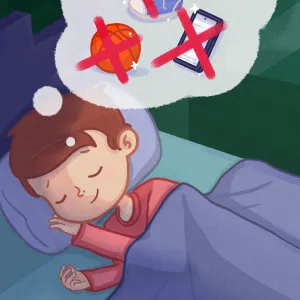We all know how important sleep is for children. One way for them to have a good sleep, is to have a routine, come and we will show you how!
Age-appropriate sleep schedules for kids
The American Academy of Sleep Medicine (AASM) has published recommendations on age-appropriate sleep schedules for children, highlighting the importance of adequate sleep for their health and development. Here is a summary:

Newborns (0-3 months old)
According to Better Health, newborns generally sleep 12 to 16 hours in 24 hours and do not know the difference between day and night. settle.
Infants (4-11 months old)
According to Amber Lore, a pediatric sleep consultant, at 11 months, 13.5 hours of total sleep per day (11 - 12 hours at night and 2 - 3 hours of daytime sleep in 2 naps) is recommended.
Toddlers (1-3 years old)
According to the Sleep Foundation, toddlers should sleep between 11 and 14 hours total, preschoolers between 10 and 13 hours total, and elementary school-aged children between 9 and 12 hours total each day.
School-age children (6-12 years old)
The American Academy of Sleep Medicine has recommended that children aged 6–12 years should regularly sleep 9–12 hours daily.
Bedtime routine by age group
Adventure awaits... in the land of bedtime! Join us through the different age ranges, where cozy pajamas become magical armor, and storybooks transform into space rockets. Get ready to create memories that shine brighter than a thousand fireflies.
Newborns (0-3 months old)
Infants (4-11 months old)
You can help him with affirmations and some relaxing massages you get in the Storybook App.
Toddlers (1-3 years old)
- 🛀Bath time
- 💩Potty time
- 👚Put on pajamas
- 📚 Massage with story time!
Put relaxing activities and sensory experiences into action, and massages can be your perfect solution.
School-age children (6-12 years old)
- 🛌Set a consistent bedtime
- 🛀Relaxing bath or shower
- 🦷Brushing teeth and flossing
- 📵Limit screen time
- 📚 Include massage with stories!
- 🗣️Talk about the day
- 👚Offer comfort and reassurance
What age should you start reading to your kid at bedtime
Research has shown that fetuses can recognize their mother's voice in the womb as early as possible, so it is never too early.
For this, you can go to our Storybook App and listen to the best stories for your little one.
Reading increases vocabulary and stimulates the imagination.
How to choose the appropriate bedtime for your child
Choosing the perfect bedtime for your child is like doing college research as the dizzying array of conflicting recommendations and advice navigating this bedtime odyssey can seem like deciphering an ancient riddle. Check out the following:
Consider your child's age and sleep needs
First, check the previous chart with the ideal ages and schedules here. Also, understand, according to the previous lists, the needs according to age.
Pay attention to your child's sleep cues
A parent should always be alert to all the signs and be aware of when the child is sleepy
Create a consistent bedtime routine
Routine is the main thing to start with; you cannot progress in this area if you do not have a consistent routine, are disciplined, and are consistent in the process.
Transform bedtime into a magical routine with the Storybook app, where you can discover interactive stories and messages, making every night a journey into the world of imagination for your little ones
"Always consider the child's age before establishing a sleep routine. Storybook suggests an excellent guide for it. Remember the importance of sleep for the proper development of a child."
💡Dra. Lorena Koppel
Factors influencing bedtime in kids
According to the National Library of Medicine, several factors affect children's sleep quality, including:
- Genetics
- Sleep habits
- Medical problems
- Parents/caregiver factors
- Screen time
- Child's environment.
These factors are interrelated and dynamic. It can be biological, environmental, and behavioral factors, and it is always indicated to go to a specialist to confirm these factors.

Written By
Francisco Cornejo, a dynamic entrepreneur with a Masters in Communication from RMIT University in Australia, is the Co-Founder and CEO of Storybook. As a serial entrepreneur, he notably served as the Chief Marketing Officer at Honda Motors in Latin America, shaping the brand's regional presence. Passionate about family well-being and communication, Francisco leads Storybook in its mission to improve children's health globally, aiming to create positive impacts in both corporate and societal spheres.
References
- Patel P., et al. (2021). An investigation into sleep quality, mental health, and the risk of burnout in caregivers of patients with epilepsy. Epilepsy & Behavior, 116, 107785. https://pubmed.ncbi.nlm.nih.gov/33572155/
- Better Health Channel. (n.d.). Typical sleep behaviour (0-3 months). Better Health Channel. Retrieved from https://www.betterhealth.vic.gov.au/health/healthyliving/typical-sleep-behaviour-nb-0-3-months
- National Sleep Foundation. (n.d.). How Much Sleep Do Kids Need? National Sleep Foundation. Retrieved from https://www.sleepfoundation.org/children-and-sleep/how-much-sleep-do-kids-need
- American Academy of Sleep Medicine. (2016). Recommended amount of sleep for pediatric populations: A consensus statement of the American Academy of Sleep Medicine. Journal of Clinical Sleep Medicine, 12(6), 785-786. https://aasm.org/advocacy/position-statements/child-sleep-duration-health-advisory/













